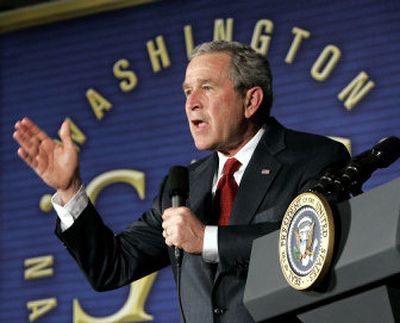Bush authorized report declassification

WASHINGTON – President Bush acknowledged Monday that he authorized the selective declassification of portions of a highly classified intelligence report in an effort to rebut critics who said the White House had manipulated intelligence to justify going to war against Iraq.
The president also called reports that the White House is weighing military action to prevent Iran from developing nuclear weapons “wild speculation.”
The Washington Post and the New Yorker magazine reported over the weekend that such planning was under way. U.S. military, diplomatic and intelligence officials have told Knight Ridder Newspapers that plans for possible air attacks are being updated because they might be needed if Russia and China prevent the U.N. from imposing tough sanctions on Iran.
“I know here in Washington prevention means force. It doesn’t mean force necessarily. In this case, it means diplomacy,” Bush told students at Johns Hopkins University. “I read the articles in the newspapers this weekend. What you’re reading is wild speculation.”
The president’s comments were his first public remarks on assertions made last week by special prosecutor Patrick Fitzgerald that Bush had authorized I. Lewis “Scooter” Libby, at the time Vice President Dick Cheney’s top aide, to disclose selected portions of a classified National Intelligence Estimate to a New York Times reporter.
Bush didn’t say whether he’d intended that the declassified information be shared with a reporter. But he said he thought that the information, much of which turned out to be inaccurate, needed to get out in public to battle critics who were suggesting that the White House had manipulated intelligence about Saddam Hussein’s weapons programs to help make its case for war against Iraq.
“I will say this, that after we liberated Iraq, there was questions in people’s minds about the basis on which I made statements, in other words, going into Iraq,” Bush told students at Hopkins’ School of Advanced International Studies. “And so I decided to declassify the NIE for a reason … I thought it was important for people to get a better sense for why I was saying what I was saying in my speeches.”
Bush authorized the release shortly after former Ambassador Joseph Wilson wrote an article that appeared on July 6, 2003, in the New York Times charging that the administration’s claim that Saddam was trying to obtain uranium from Niger was false.
In a court filing last week, Fitzgerald said Libby had told a federal grand jury that he had a conversation with former New York Times reporter Judith Miller on July 8, 2003, “only after the Vice President advised the defendant that the President specifically had authorized defendant to disclose certain information in the NIE.”
Libby’s conversation with Miller came under scrutiny as part of Fitzgerald’s investigation into who leaked information that Wilson’s wife, Valerie Plame, was an undercover CIA officer after her name appeared in an article by syndicated columnist Robert Novak.
No one has been charged with revealing Plame’s name. Libby is charged with five counts of perjury, obstruction of justice and lying to the FBI about the case. If convicted, he could face up to 30 years in prison and a $1.25 million fine.
The disclosure that Bush and Cheney had authorized Libby to talk about the NIE has raised new questions about the administration’s candor about what it knew about Saddam’s weapons programs.
By the time Libby disclosed portions of the NIE, the Niger allegation already had been largely discredited, and much of the other classified information that administration officials revealed about Iraq was wrong, exaggerated or disputed.